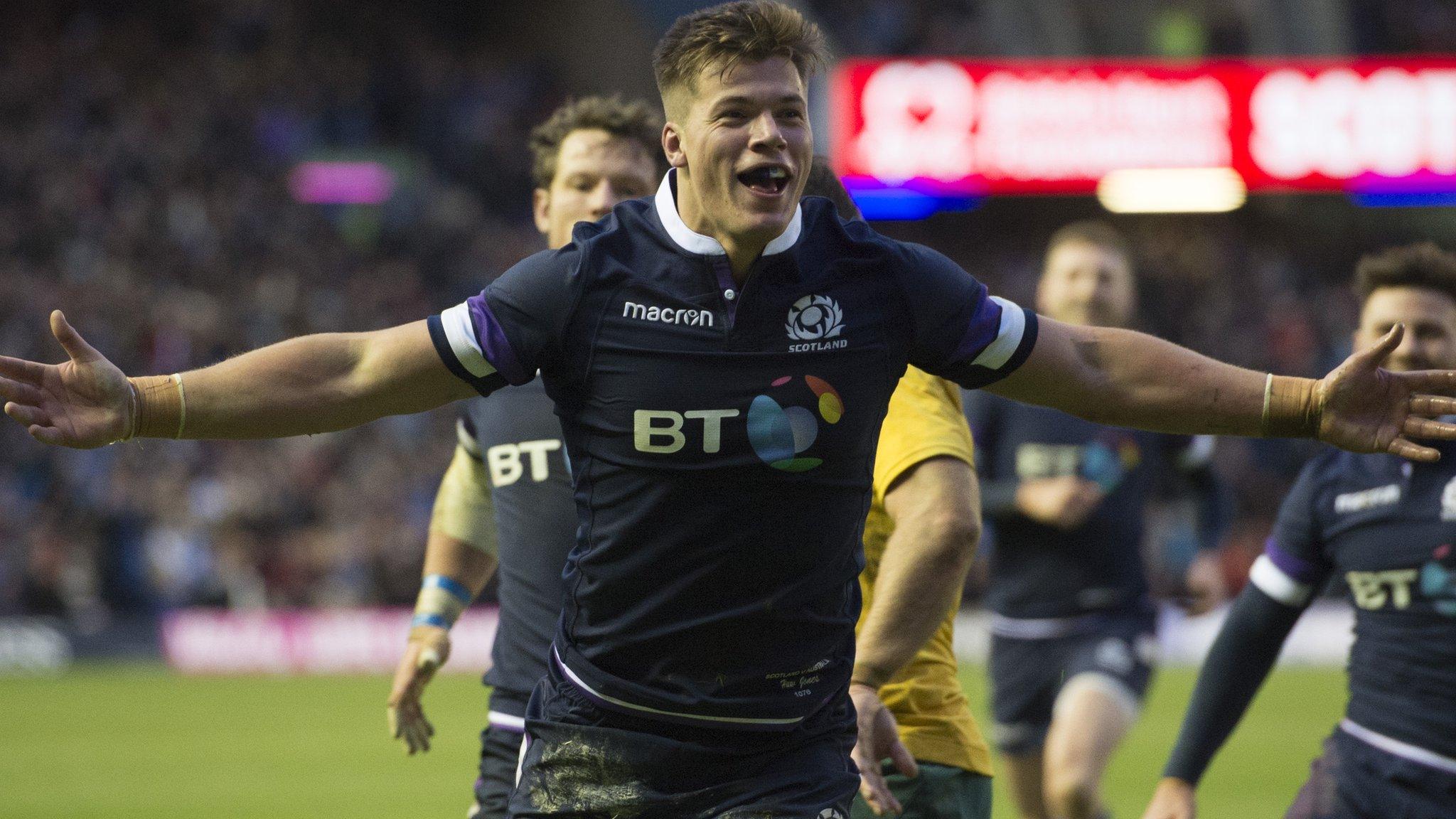Scotland: Autumn Test displays means side looks like Six Nations contenders
- Published
- comments
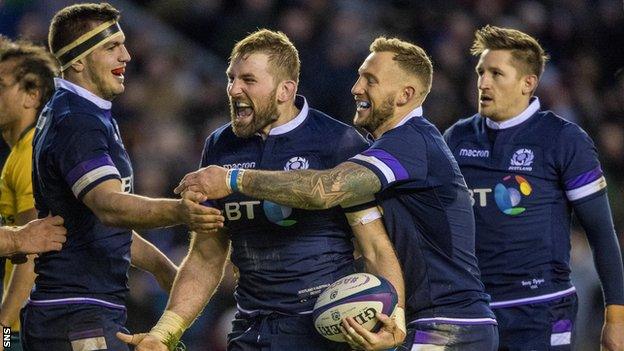
Scotland ended their trio of autumn Tests with a record shellacking of Australia
For much of the past 17 years the regular thumbing of the record books has been like a recurring journey into darkness for Scottish rugby fans.
Every time they looked to the past it was as part of an exercise to figure out how grim things were in the present. The most consecutive losses, the most games without a try, the highest points total against, the most tries conceded.
It's been horrendous. The years came and went and, occasionally, there was a hint of hope, quickly followed by more despair.
All the while the Scottish game hung on to the notion that things were cyclical, that the progression their Celtic cousins, Wales and Ireland, had made in the 2000s would soon be theirs.
Throughout all of this, Murrayfield tended to be full, or mostly full, for Test matches. Against all evidence, and in the face of years of failure, people kept turning up, kept looking on the bright side. You could combine the faith of every religious order in the world and multiply it by 10 and you'd still be short of the forgiveness and belief shown by the Murrayfield flock.
Those record books were revisited in the wake of the pummelling of Australia on Saturday. The biggest-ever win against the Wallabies, the most tries and most points ever scored against a tier one country, the first time in a decade that Scotland scored 50 points against anybody.
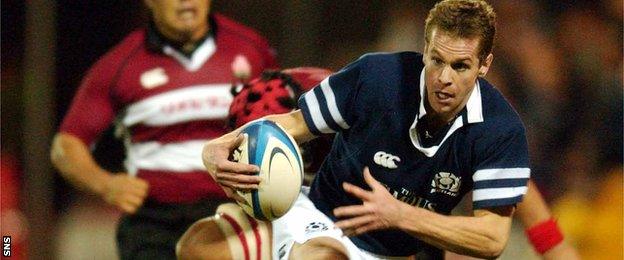
Chris Paterson scored 40 points in Scotland's biggest-ever victory, a 100-8 thumping of Japan in 2004
This was the 10th time that Scotland scored a half-century in a Test. It's instructive to look at the countries they've done it against - Portugal, Japan (twice), USA (twice), Romania (twice), Zimbabwe (twice) and the Ivory Coast.
Of course, the Scots were playing against 14 men for half a game, but in his opening remarks Michael Cheika, the Wallaby head coach, displayed a lot of class when he down-played the significance of Sekope Kepu's red card.
Cheika said that good sides can still find a way to compete despite a numerical disadvantage. It didn't help, for sure, but it didn't explain the whopping final score. There are loads of examples of sides rising above the loss of a man.
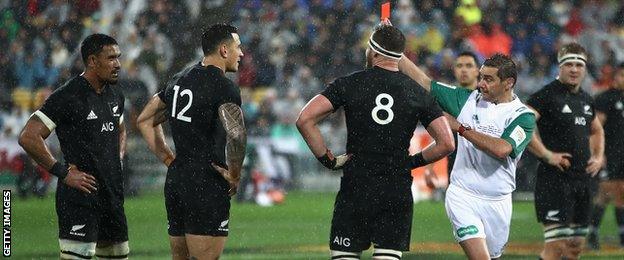
Sonny Bill Williams, in the number 12 shirt, was sent off in New Zealand's second Test defeat by the British and Irish Lions
New Zealand lost Sonny Bill Williams in the 25th minute of the second Test against the British and Irish Lions and still took Warren Gatland's team to the wire, losing by just three points. Elliot Daly was shown a red in the opening minutes of England's Test against Argentina last year, but England still won. Ireland lost CJ Stander after 23 minutes in South Africa in the summer of 2016 and yet they went on to win the match. A red card doesn't always render the Test a slaughter, but that is what Saturday became.
This autumn looks like a hugely significant step forward for Scotland, a series where questions were asked and questions were answered. Could they overcome a huge injury list? Could they compete against the All Blacks? Could they suffer the late loss of Stuart Hogg yet still beat the Wallabies? Yes, yes and yes.
After so many years of dejection, you still hesitate to say Scotland are now contenders for the Six Nations, but it sure looks like it. At last, perhaps, that light at the end of the tunnel is a beacon of opportunity rather than an oncoming train.
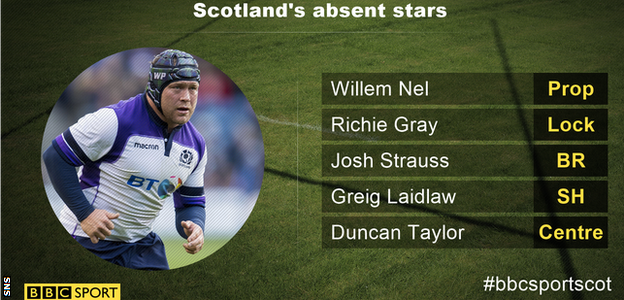
Consider the absent men on Saturday. This is a team made up of players who saw no action against Australia. Some didn't see any action against New Zealand the week before either. Stuart Hogg at full-back, Lee Jones on one wing, Duncan Taylor on the other, Matt Scott and Alex Dunbar in the midfield. We'll return to the vexed problem of fly-half but at scrum-half, Greig Laidlaw; in the front-row, Alasdair Dickinson, Ross Ford and WP Nel. Second-row: Richie Gray and Tim Swinson. Back-row: Josh Strauss, Luke Hamilton and Dave Denton.
Our absent 15 is actually an absent 14. There is nobody at 10 because there is nobody remotely in Finn Russell's league. If the great triumph of the autumn is the increase in Scotland's depth, then 10 remains a problem. If anything happens to Russell then you're looking to convert a centre or promote a kid. It remains the biggest worry.
And the fretting is only going to increase next season when Russell takes his leave of Scottish rugby and heads for the riches of Racing in Paris. When your one irreplaceable asset is no longer under your control, that's serious.
In his treatment by the Scottish Rugby Union, Russell is used to cotton wool. He's going to get barbed wire in Paris. His departure is a massive concern.
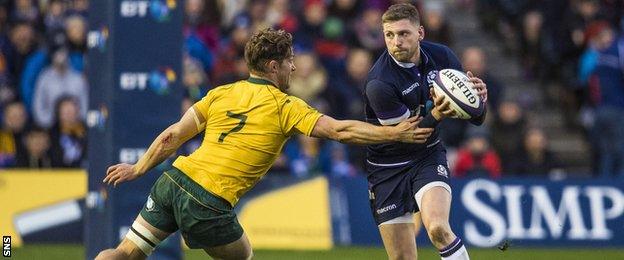
Finn Russell will join Racing 92 at the end of the season
This autumn has delivered all manner of stories and all sorts of surreal things. The sight of Scotland taking the game to the All Blacks in the closing minutes despite having a front row of Jamie Bhatti, Stuart McInally and Simon Berghan, with the young hooker, George Turner, playing on the flank, was extraordinary.
Darryl Marfo has come into this team via Disneyland, such is the fairytale his story represents. Bhatti has been excellent as his understudy at loose-head. In the overall scheme of things, those two would be fourth and fifth choice behind Dickinson, Gordon Reid and Allan Dell, but they've thundered into our consciousness now.
Bhatti's broken-field running on Saturday was electrifying. He ran for 41 metres, was instrumental in one try, contributed heavily to another, and made 11 tackles. If you were to name a feel-good story of the autumn you'd give it to Marfo, but Bhatti deserves acknowledgment. If he's been unsung outside the squad, then let's start singing.
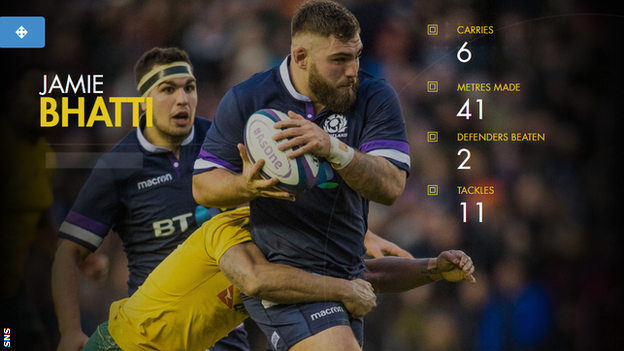
Selecting a player of the series is a puzzler, because there's been a few. Hamish Watson, McInally, Huw Jones. You couldn't argue with any of them. Watson and McInally made 20 tackles apiece against Australia. McInally scored his third try in three matches into the bargain. Jones, as clever a centre as there is in European rugby, got his seventh try in 11 Test matches. John Barclay gets the nod here for an intensity and a leadership that never let up, not for a second.
If Marfo, Bhatti or Byron McGuigan were the discoveries of November, then McInally was the rediscovery. He's been sensationally good. Two summers ago he was deemed the coming man while on tour in Japan, but it didn't work out. Now, he's right there, in possession and seemingly going nowhere. Fraser Brown is an outstanding rugby player, but if the Six Nations began tomorrow, McInally would be in there from the start.
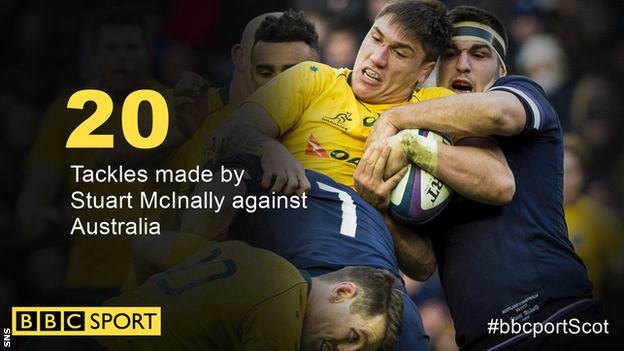
Scotland play the kind of rugby that reminds you why it is you love the game. Fast and furious. High pressure and highly skilled. They think quicker than they used to, they're more accurate and more lethal than they've been since 1999.
They can score from not a lot. A ball goes down on halfway and they're on it and score. A kickable penalty in the 22, they tap and score. A gap and they're through it and score.
They feed off chaos and unstructured rugby. The wilder and faster the better. They have the players with the skills to beat most sides when things get frantic, but the Six Nations isn't often like that.
Things are tighter, the battle is more intense. Tournament rugby is - and always will be - harder than summer and autumn internationals. The Six Nations is the true testing ground of Scotland's progress.
Scotland's autumn internationals | |
|---|---|
Saturday, 11 November | |
Saturday, 18 November | |
Saturday, 25 November |
Scotland go to Wales first up. They've lost eight in a row in Cardiff. They go to Dublin too, where they've lost four in a row. They host England on the back of eight straight losses. In the heat of the Six Nations, all of these games are winnable yet all of them are losable.
For the re-energised Scotland fan, it can't come quickly enough. Instead of watching between the cracks in their fingers, they'll look on with the bit between their teeth.
- Published27 November 2017
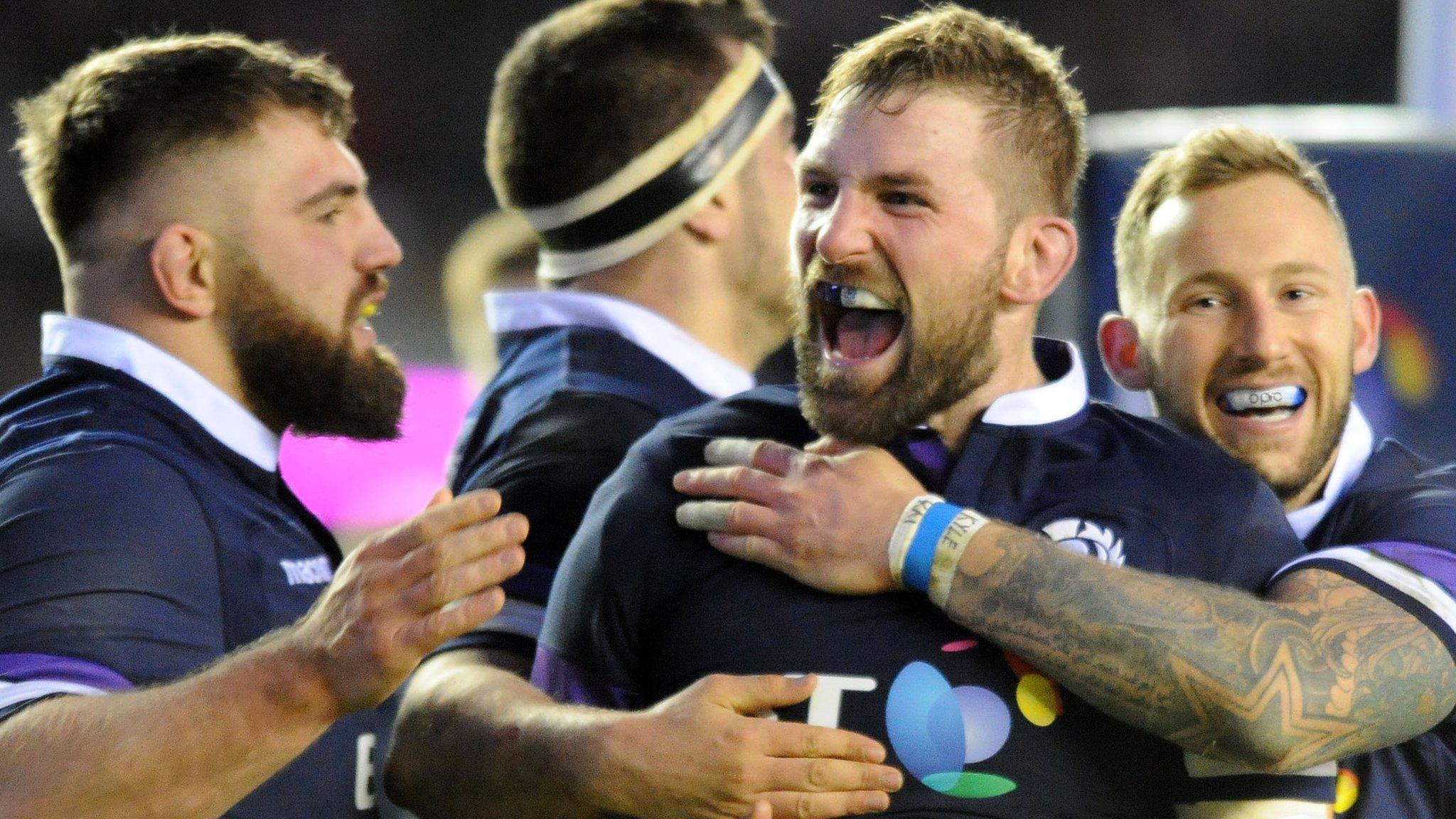
- Published26 November 2017
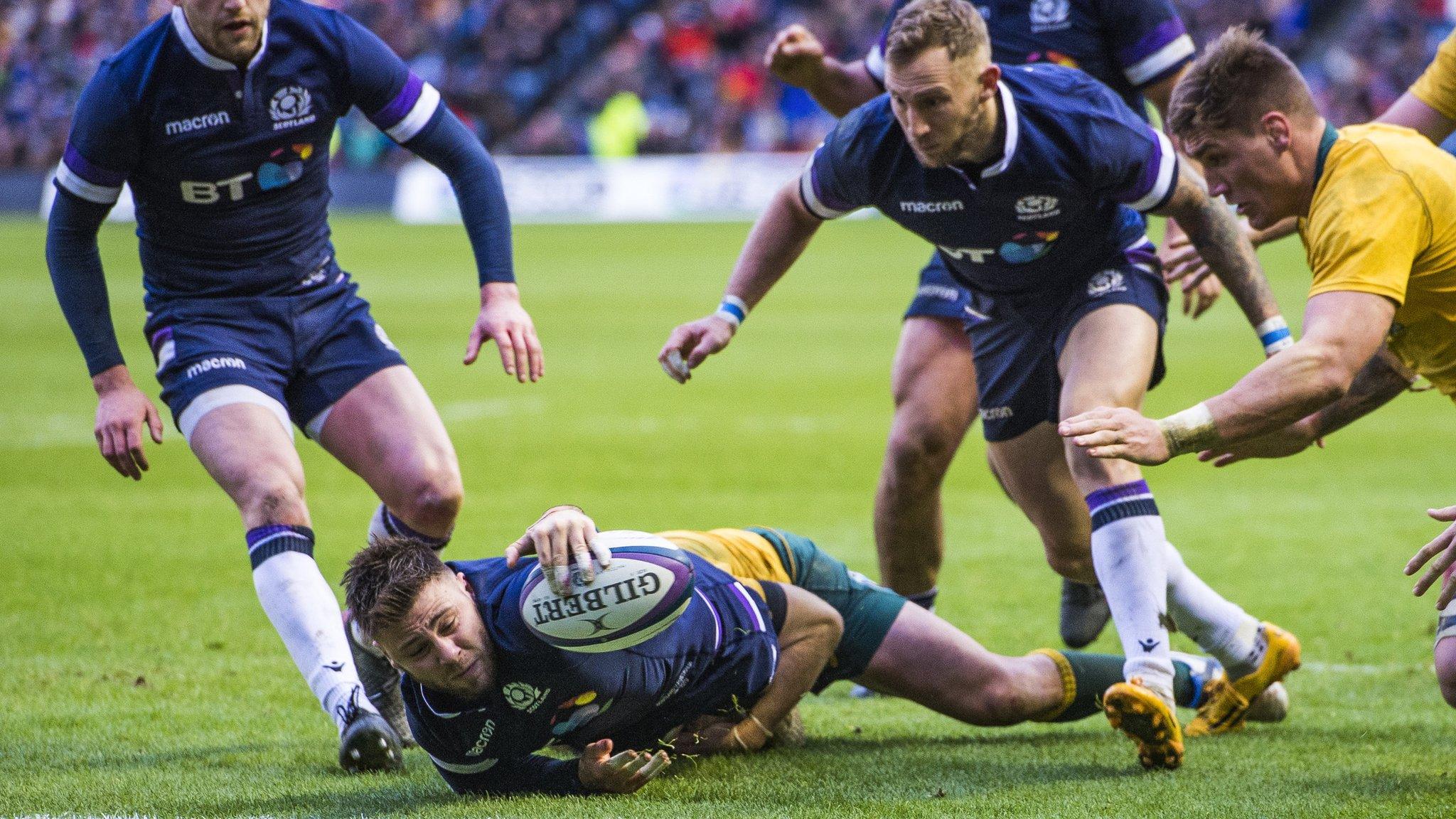
- Published25 November 2017

- Published25 November 2017
